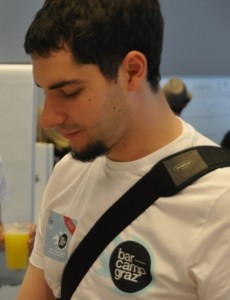My objectives as a Panton Fellow

Photo by Rene Kaiser
Hi, my name is Peter Kraker and I am one of the new Panton Fellows. After an exciting week at OKCon, I was asked to introduce myself and what I want to achieve during my fellowship, which I am very happy to do. I am a research assistant at Know-Center of Graz University of Technology and a late-stage PhD student at University of Graz. Like many others, I believe that an open approach is essential for science and research to making progress. Open science to me is about reproducibility and comparability of scientific output. Research data should therefore be put into the public domain, as called for in the Panton Principles.
In my PhD, I am concerning myself with research practices on the web and how academic literature search can be improved with overview visualizations. I have developed and open-sourced a knowledge domain visualization called Head Start. Head Start is based on altmetrics data rather than citation data. Altmetrics are indicators of scholarly activity and impact on the web. Have a look at the altmetrics manifesto for a thorough introduction.
In my evaluation of Head Start, I noticed that altmetrics are prone to sample biases. It is therefore important that analyses based on altmetrics are transparent and reproducible, and that the underlying data is openly available. Contributing to open and transparent altmetrics will be my first objective as a Panton Fellow. I will establish an altmetrics data repository for the upcoming open access journal European Information Science. This will allow the information science community to analyse the field based on this data, and add an additional data source for the growing altmetrics community. My vision is that in the long run, altmetrics will not only help us to evaluate science, but also to connect researchers around the world.
My second objective as a Panton Fellow is to promote open science based on an inclusive approach. The case of the Bermuda Rules, which state that DNA sequences should be rapidly released into the public domain, has shown that open practices can be established, if the community stands together. In my opinion, it is therefore necessary to get as many researchers aboard as possible. From a community perspective, it is the commitment to openness that matters, and the willingness to promote this openness. The inclusive approach puts the researcher in his or her many roles at the center of attention. This approach is not intended to replace existing initiatives but to make researchers aware of these initiatives and helping them with choosing their approach to open science. You can find more on that in on my blog.
Locally, I will be working with the Austrian Chapter of the Open Knowledge Foundation to promote open science based on this inclusive approach. Together with the Austrian Student’s Union, we will be having workshops with students, faculty, and librarians. I will also make the case for open science in the research communities that I am involved in. For the International Journal on Technology Enhanced Learning for example, I will develop an open data policy.
I am very honored to be selected as a Panton Fellow, and I am excited to get started. If you want to work with me on one or the other objective, please do not hesitate to contact me. You can also follow my work on Twitter and on my blog. Looking forward to furthering the cause of open data and open science with you!
[…] My objectives as a Panton Fellow | OKF Open Science Working Group – Kurzer, aber lesenswerter Beitrag von Peter Kraker, der einer der neuen Panton Fellows ist. […]
[…] This is a reblog from the OKFN Science Blog. To my excitment and delight, I was recently awarded a Panton Fellowship. As part of my duties, I […]
Congratulations on becoming a Panton fellow!
By the way, there’s a typo in your link to “pantonprinciples.org”.
Thanks Robert, I just fixed it!
[…] My objectives as a Panton Fellow […]